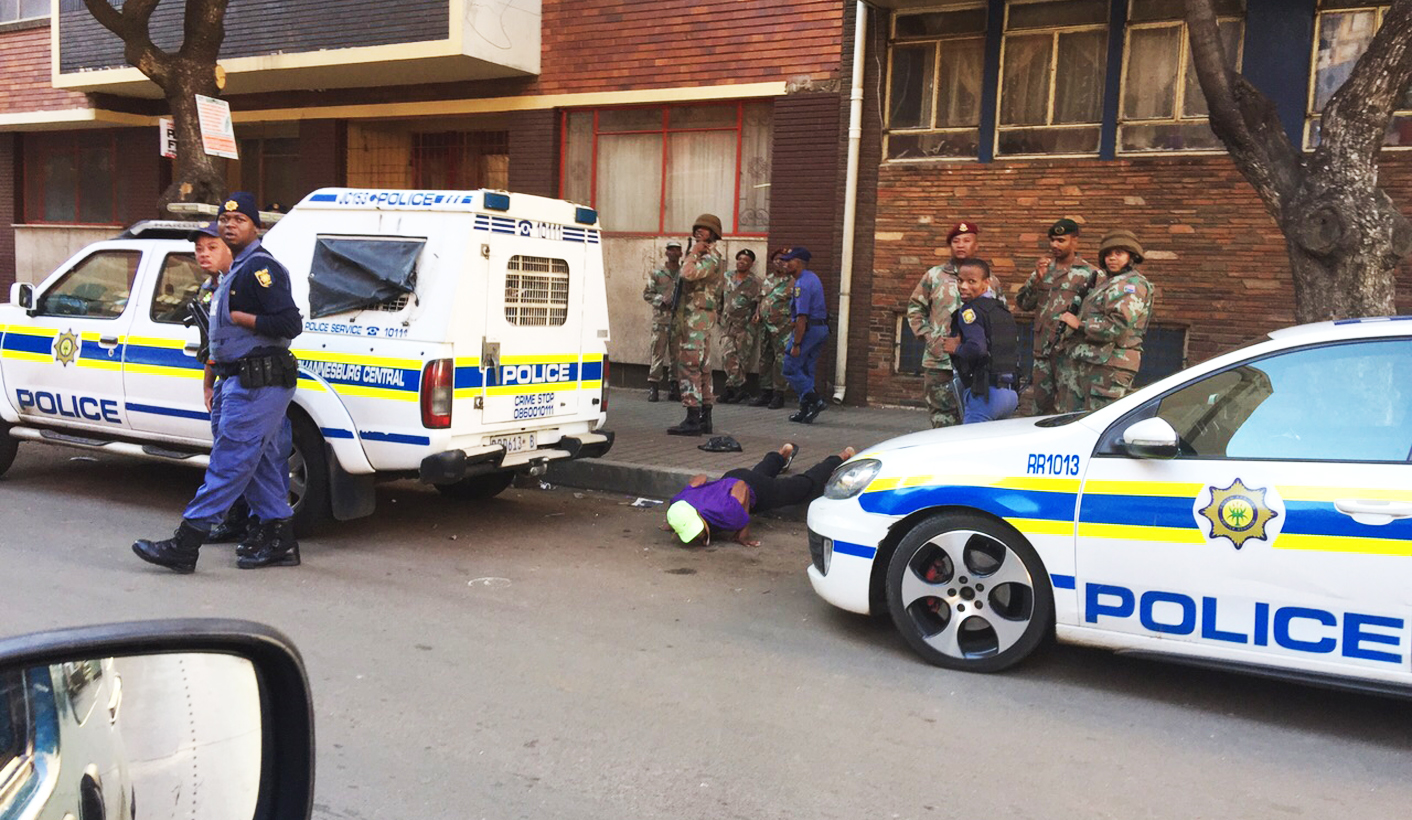In a joint operation featuring both the police and the SANDF on Monday, around 50 undocumented migrants were arrested across Hillbrow, Johannesburg central and Mayfair in stop-and-search patrols in the morning. The deployment of defence force officers follows raids last week in Johannesburg on the Wolhuter Hostel in Jeppe and the Madala Hostel in Alexandra in the state's response to xenophobic violence.
Unlike last week's raids, which targeted the migrant workers' hostels that are often portrayed as symbols of violence, Monday's operation shifted the focus to predominantly African migrant communities. While targeting the migrant communities comes in response to many concerns, raised by both government and South Africans, this year, it also appears to target those who have been vulnerable to the violence. Gauteng police spokesperson Lungelo Dlamini said the deployment was part of crime prevention.

Nigel Branken, who moved his family to Hillbrow to engage with the social challenges in the area, saw the SANDF on the streets on Sunday and perceived it as a type of war on the poor. People were being stopped and searched indiscriminately in the streets and when Branken took pictures of the army officers they tried to force him to delete them. He managed to keep the pictures by referring to the Constitution. He was speaking to Daily Maverick on Sunday from Charlotte Maxeke Hospital where he said staff did not want to treat a foreigner he had brought there, a moment of much broader institutionalised xenophobia.
On Friday, the presidency said President Jacob Zuma had employed 338 members of the SANDF to assist police “to maintain law and order in KwaZulu-Natal, Gauteng and any other area in the Republic of South Africa as the need arises” until 30 June 2015 at the cost of R4,242,448.
Last week Defence Minister Nosiviwe Mapisa-Nqakula announced the SANDF would be deployed to assist police to “reclaim the streets” after xenophobic violence erupted around Durban at the end of March. It later spread to some parts of Johannesburg. She said police had requested support and would guide the operation aimed at restoring order in hotspots of violence. “The army will be deployed because there is a crisis,” said Mapisa-Nqakula.
“There will be those who will be critical of the decision we've taken. There will be those who will commend the decision. But those who are the most vulnerable, those who are walking on foot and use taxis will appreciate it, will appreciate the decision we have taken of bringing in the Defence Force,” said the minister, emphasising that with the army on the ground violence will not be tolerated.
Zuma said the defence force had been deployed under section 201 of the Constitution that deals with political responsibility in relation to defence. It was authorised under 201 (2) (a) which states, “Only the president, as head of the national executive, may authorise the employment of the defence force [a] in co-operation with the police service.”
In his Freedom Day address on Monday, Zuma said it was a difficult period for the country and listed the three South African victims of the latest attacks – Ayanda Dlamini, 22 years old, Thabo Mzobe, 14 years old, and Msawenkosi Dlamini, 29 years old – as well as Manuel Jossias, who was killed in Alexandra and is better known as Emmanuel Sithole. He said the authorities were working with embassies to identify the other three foreigners killed in KwaZulu-Natal.
“The latest outbreak of violence necessitates more comprehensive action from all of us to ensure that there is no recurrence. We have to address the underlying causes of the violence and tensions, which is the legacy of poverty, unemployment and inequality in our country and our continent and the competition for limited resources,” said Zuma, speaking at the Union Buildings.
During the violence, the state has cast the issue as one of migration, necessitating stricter controls on foreigners inside and coming into the country. On Monday, Zuma addressed South Africans' complaints about foreigners. “These include that the number of illegal and undocumented migrants is increasing, that they take their jobs as some employers prefer workers who are prepared to accept lower wages. There are also complaints that foreign nationals benefit from free government services, and that they run businesses illegally. There is also an accusation that undocumented foreign nationals commit crimes in the country. We reiterate that none of these complaints can justify attacks on foreign nationals and the looting of their shops.”
The xenophobic violence calmed last week as the state increased its response. Zuma and his ministers, even King Goodwill Zwelithini, appear to now be taking the issue seriously and inviting the media to accompany the police and SANDF on the hostel raids. This appears to part of a campaign to show the world, including critical African nations, that the state cares about migrants.
With images of the police and SANDF responding to xenophobia beamed around the country and the world, it appears the security forces are being used to quell local concerns. The areas hit on Monday are well-known for their foreign communities and with the SANDF mandated to act within the country for another two more months, it’s likely that there will be similar operations in the future – and more questions about their role on our streets. DM
All photos of SANDF stop-and-search patrols in Hillbrow by Nigel Branken.




